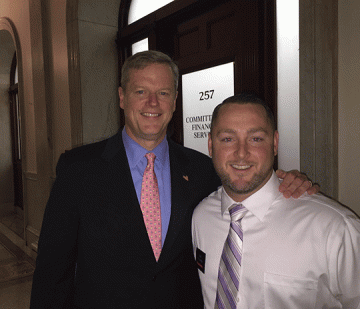What drew you to your program?

I decided to pursue my MSW after speaking to a colleague who was a professor at Simmons. She gave the MSW program tremendous praise. I'm extremely grateful I made the decision to enroll — it has been nothing but a joy and privilege to be in a field that I am truly passionate about.
What's your favorite part of your program?
The level of intimacy and care shown by the entire staff at Simmons. I'm still blown away at the sense of community I felt almost immediately after I was accepted into the MA program. It's nice to truly feel cared for and welcomed.
What organizations have you founded?
I founded WickedSober.com and am also the co-founder of Healing Hills Village Addiction Treatment and Recovery Community. I started Wicked Sober in 2013 as a direct result of my own personal struggles with addiction. It's a statewide hotline for individuals looking for assistance with their addiction.
Addiction is a disease of isolation and unmanageability. To expect an individual struggling with substance abuse to manage their own care is unrealistic. I received most of the advice on treatment options from those I was using with. The process was very overwhelming and I was often told to keep calling back because there were no beds available for treatment. My solution was to keep using so I wouldn't go into withdrawal. Most of the time I never called back. After multiple attempts at treatment, I found myself stuck in a vicious cycle looking for a quick fix that didn’t exist. Addiction is a chronic illness which needs to be treated on an ongoing basis with a continuum of care. I eventually went out-of-state for treatment because it was very difficult to find a program in Massachusetts. The program I went into helped me establish a sense of self-worth.
The reason I founded Healing Hills Village in Westminster, MA was to create more of the types of resources that were offered out-of-state. We opened in early 2016 and offer every level of care: detox, residential and outpatient services. We're able to provide long-term treatment for clients in an atmosphere that helps build self-esteem and self-worth.
Tell us about your work with Governor Baker's opioid addiction awareness campaign.
Governor Baker allocated funds for a statewide campaign to combat the stigma of opioid addiction — the hashtag is #StateWithoutStigMA. Stigma was a huge barrier for me. I was afraid to ask for help out of fear of being judged.
I had the honor of working with the Governor’s office and having my face and voice on radio, social media, banners and billboards in both English and Spanish. The campaign has had a far reach and now we have individual towns and cities pledging to be a community without stigma and hanging the banner outside their own city halls.
What progress are you seeing in terms of opioid addiction treatment in Massachusetts?
I believe Massachusetts is ahead of many other states in terms of treatment and advocacy, but the issue is still the lack of long-term treatment options. Detox is the first step but it isn’t always easy to transition to a residential program because of limited bed availability.
In order to enact real change, it’s important to continuously smash the stigma and invite more people to voice their concerns for change and better resources. Changing the public perceptions of addiction can hopefully help to create more resources. Massachusetts leads the charge on treating this epidemic as more of a public health crises than a criminal justice problem, which encourages more enthusiasm for treatment versus incarceration.
If anyone reading this is coping with a loved one suffering from addiction, what are the first steps they can take?
Reach out for help. Educate yourself on addiction and what resources are available. The window when a loved one struggling with addiction is willing to seek treatment can close very quickly. We work behind the scenes with families to prepare them for that moment so they know how to react and take advantage of that willingness before it fades.
